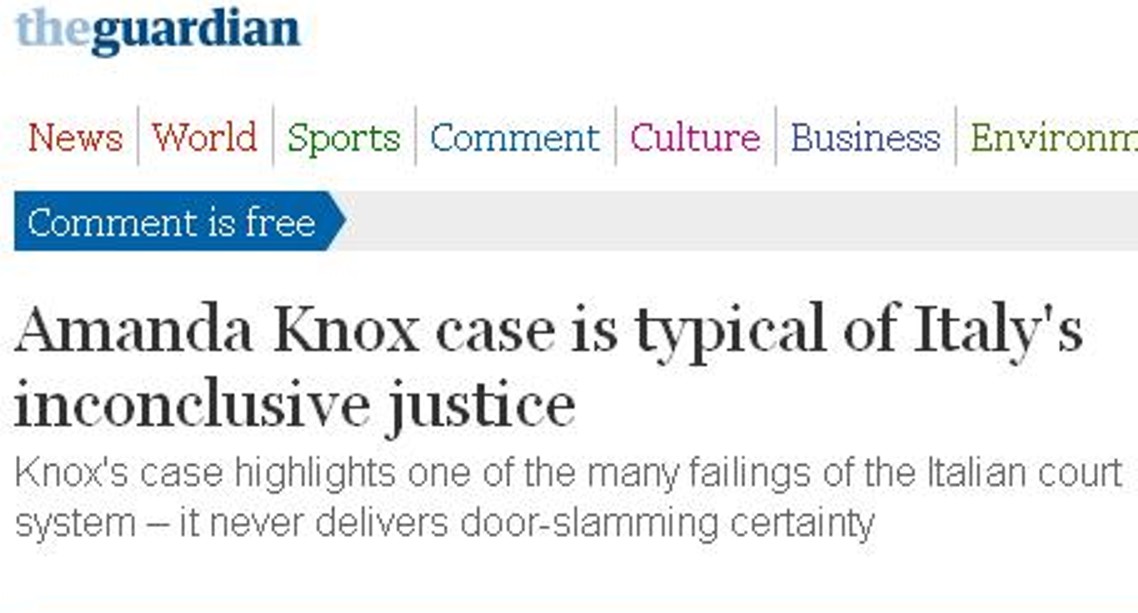
Tuesday, October 04, 2011
The Guardian Publishes A Negative Take On Italian Justice Rather Poorly Researched
Posted by Peter Quennell

Click above for Tobias Jones’s take in the Guardian which seems to be trying to report evenly on the case..
Here are our most-read posts on first trials by Italian poster Nikki and the two appeals by Italian poster Commissario Montalbano and often-overlooked victims’ rights about Italian campaigner Barbara Benedettelli.
All explain better than Tobias Jones does the many hoops that prosecutors have to jump through for victims’ interests to come out ahead..
We can agree with Tobias Jones on this below - the elaborate, expensive and slow automatic first appeals complete with lay judges who don’t see the first pass of the evidence at first trial and often act as a wildcard in the process.
It’s one of the many failings of Italian justice that it never delivers conclusive, door-slamming certainty. What usually happens is that the door is left wide open to take the case to the next level, first to appeal and then to the cassazione, the supreme court. The score in the public imagination, at the moment, is simply one-all.
It’s always been that way. There’s barely one iconic crime from the post-war years that has persuaded the country that, yes, justice has been done: the murder of Pier Paolo Pasolini, the Ustica crash, the Bologna railway station bombing, the Piazza Fontana atrocity, the Monster of Florence murders, the murder of Luigi Calabresi, the “caso Cogne” “¦ none has ever been satisfactorily, convincingly resolved. Instead the country seems to split into innocentisti and colpevolisti (those who believe in the innocence or guilt of the accused) and the heated debates continue for decades.
But we’d agree less-so, at least from an American perspective, with the Italian uniqueness of this below.
Dietrologia ““ literally “behindery” or conspiracy-theorising ““ is a national pastime precisely because the courts don’t offer convincing verdicts. It allows every journalist, magistrate and barfly to try their hand. The result is that everyone with an active imagination has a go at explaining the truth behind the mystery, and inevitably the truth only gets further buried beneath so many excited explanations. The media plays an active role in keeping the circus going: in no other country are cronache nere ““ “black chronicles” ““ so much the mainstay of the evening news. There’s always a case on the go.
Tobias Jones should watch the urbane elegance of the Porta a Porta shows, which are reminiscent of human games of chess, and then visit the US and watch all the cable news channels devoting many hours a day to legal talking heads debating one another over high-profile crime cases. CNN and MSNBC could probably not survive without them (Casey Anthony was a godsend) and they go back to the OJ Simpson trial when it seemed half the country joined in.
He probably has a good point about subjudice (blackouts on court news in the UK) but there’d seem more chance of a wrong outcome driven by public opinion in the US with its elected judges and police chiefs and prosecutors angling for news exposure than in Italy. (Judge Michael Heavey is an elected judge.)
Local public opinion in the US is very much behind the high execution rate in several American states and the difficulties non-whites often have in getting off.
Comments
Hungarian linked to this first explanation of why the jury acted as it did by a juror in Meredith’s case.
http://www.guardian.co.uk/world/2011/oct/04/amanda-knox-juror-speaks-out
You can see demonstrated there one systemic problem of the Italian system. Appeal jurors must have higher educational qualifications than trial jurors. But why exactly?
Italians who served on juries tell us appeal juries often exude a sort of snobbishness and condescension toward the trial juries who first decided on the case. Those dummies didnt get it right and we smarties are here to put our finger on deeper truths.
It is well known who jurors are and it can be a big plus locally to serve on a “winning” jury. The appeal jurors may be feeling some heat but maybe arguing back strongly - just as Casey Anthony’s jurors did.
The Guardian also posts an editorial. http://www.guardian.co.uk/commentisfree/2011/oct/04/kercher-murder-revolving-door
The one-day-a-week sessions (on saturdays) were to accommodate the DEFENSE counsel Giulia Bongiorno when she announced early on that she was pregnant.
The appeal took about as long as the trial, but with less than half the court sessions. In fact there was a real sense of pouring it on by the prosecution which did a relentless job in 2009.
The trial only slowed and saw sessions postponed when the weak and indecisive defenses took over. They were just flummoxed by all the evidence in the first trial.
Hi Pete,
The author of the editorial wrote the following:
“Videos show how investigators passed it around with contaminated gloves.”
This is not true. How can anyone tell that the gloves were contaminated just by looking at them? Vecchiotti and Conti never proved that there was any contamination.
Hi Machine
Thanks. These damaging mistakes simply never stop do they? But we keep showing them up.
Where next:
Click here to return to The Top Of The Front PageOr to next entry Understanding Yesterday’s Knox/Sollecito Verdict
Or to previous entry Media Reaction Commences: What Is It About Amanda Knox…
